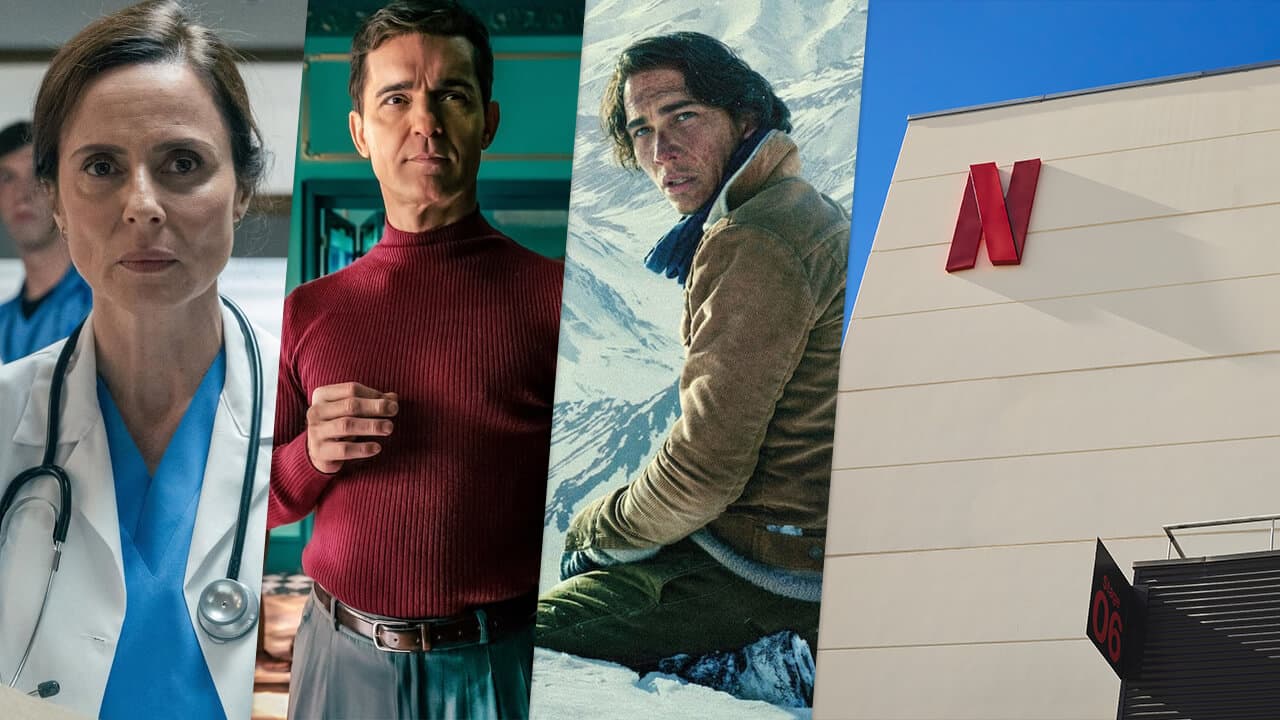
Pictures courtesy of Netflix
This week, we were invited, alongside journalists from major Hollywood trades and local journalists from across Europe, South Africa, and the Middle East, to tour the production facilities Netflix has at Tres Cantos, just north of Madrid, Spain.
If you missed my first two reports from my visit to Tres Cantos, I published them on Wednesday and Thursday. On Wednesday, I spoke about the set visit for Breathless (Respira), and on Thursday, the set visit to the upcoming period drama comedy The Lady’s Companion (Manual para señoritas).
Below, I wanted to get into the rest of everything else I learned from the tour, which involved several set visits, a look inside an edit room, and a roundtable. The tour was primarily helmed by Larry Tanz (VP of Content EMEA), Diego Ávalos (VP of Content Spain, Portugal & Nordics), and Victor Marti Farres (Director of Production and Post-Production, Spain).
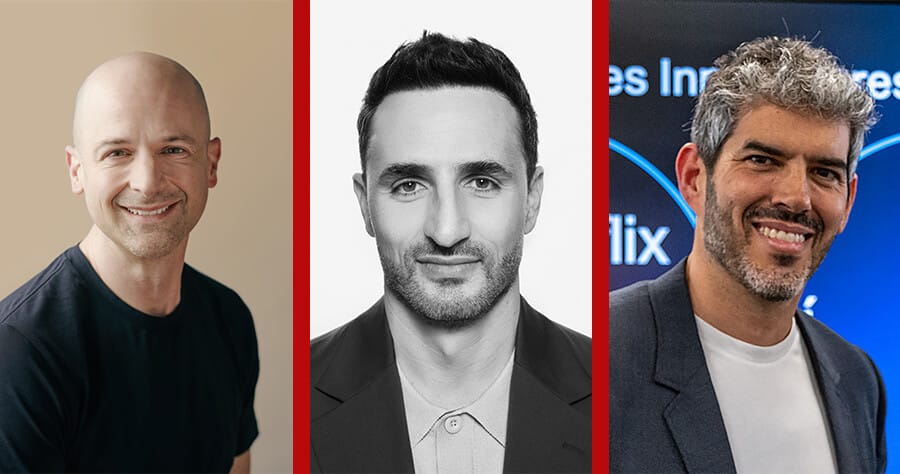
Pictured: Larry Tanz, Diego Ávalos and Victor Marti Farres – Netflix
The production hub is approaching its fifth anniversary and has been the home to some massive productions over the years. Society of the Snow is perhaps the latest example of taking full advantage of modern and advanced facilities. Other shows filmed here include Money Heist, its spin-off BERLIN, and Valeria and Elite.
The facility is the biggest filming location in the European Union, covering over 22 thousand square meters. It boasts ten stages, each with “complementary facilities including storage and office spaces, backstage, and make-up and hair areas.” For post-production, the complex has 30 editing rooms, two color grading rooms, and two sound mix rooms.

Pictures: Netflix
Netflix Production Hubs Are Autonomous But Completely Integrated Into The Larger Netflix Ecosystem
This production hub’s design essentially allows a show or movie to go through every stage of its life, from development to greenlight, production, and post-production, without ever needing to interact with the so-called Los Angeles or Los Gatos motherships.
Talking about how it used to work, Tanz said, “Álex Pina talks about having to fly to LA to pitch a show so that he could make a show in Spain. Or for some other creators, having to figure out a way to break into Hollywood just so that they could realize a creative vision.”
“Fast-forward to today,” Tanz continued, “We have 11 offices. We have full teams in those different countries: creative, production, post-production, business affairs, production finance—everything that you would have in a studio operation. And they’re working with local talent.”
Tanz and Ávalos cited this way of working as the blueprint rolled out across Europe and the world. This more efficient approach ensures authenticity and resonance with local audiences, facilitating high-quality, culturally relevant content.
Despite primarily focusing on local content, the readiness to lend support extends to productions outside Spain. The Mother, Warrior Nun, The Crown, and the upcoming Jeff Goldblum series Kaos were cited in filming in Spain, with American and British teams helming them.
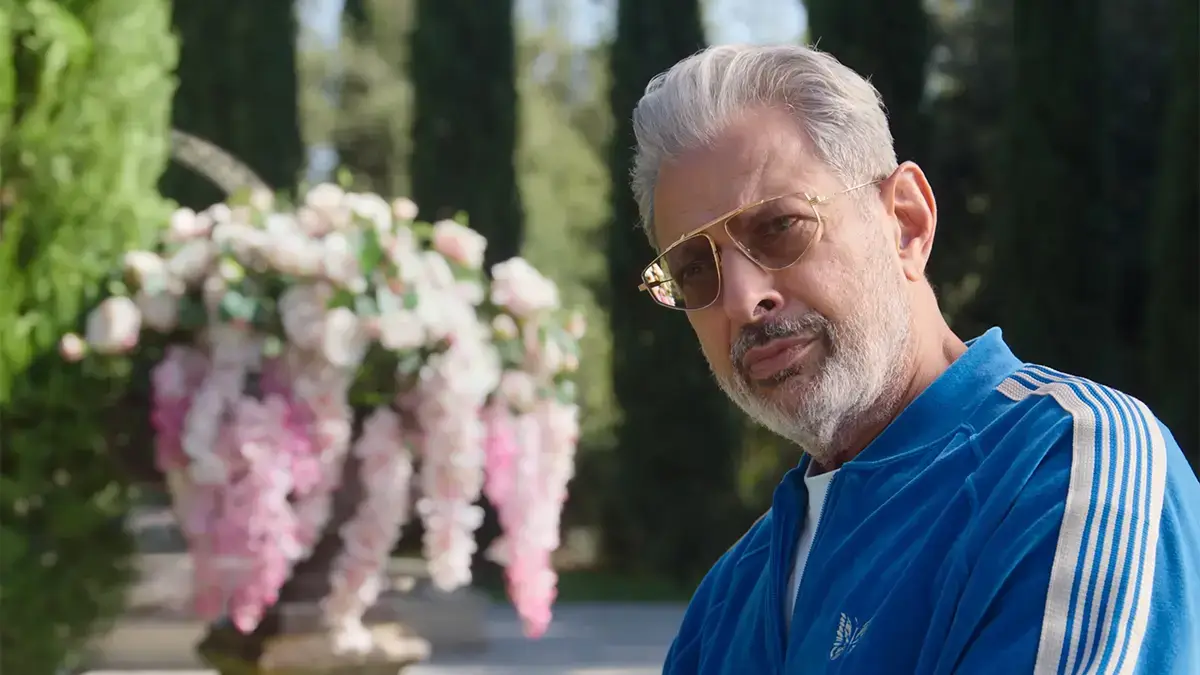
Kaos is one of the shows shot in Spain – Picture: Netflix.
The post-production facilities on site are where the hub is most plugged into Netflix’s global infrastructure. They host new technologies that have been pioneered and tested here first.
Most notably, they use Netflix’s cloud-based remote solutions throughout, enabling editors to work collaboratively across different locations and time zones.
This innovation is particularly showcased with one example cited by Farres, “We have a show that is being edited between editors in Mexico, editors in Colombia, and editors in the States, all together connected to that data center that we have here.”
According to Farres, the tools bring creators efficiency and flexibility. He cited another example of a Portuguese series, Turn of the Tide (Rabo de Peixe), which utilized the facility’s capacity to handle extremely large data volumes (two terabytes per day), which can be edited on and worked with the day after the shoot by editors based in Lisbon.
Part of the tour allowed us to go into the edit bay to see how one editor was working on a TV show using this technology, all accessed from the cloud. We saw him scrubbing through footage in spectacular quality and pulling through clips instantaneously, with rarely any buffering or latency. Presumably, he’d be able to save his work here and pick up right where he left off at home.
Tanz stated that what Netflix has at Tres Cantos are “world-class post-production facilities,” adding, “Having spent 20 years in Hollywood and Warner Brothers and Universal and Sony stages, these are, in some ways, even a level above because they’re new with all soundproofing and modernization that some of those stages don’t have, and these are on par or ahead of the top stages in Hollywood.”
Development on these tools isn’t just made in Los Gatos either. Farres told me they have engineers onsite to troubleshoot and implement solutions for specific shows or movies on their slate.
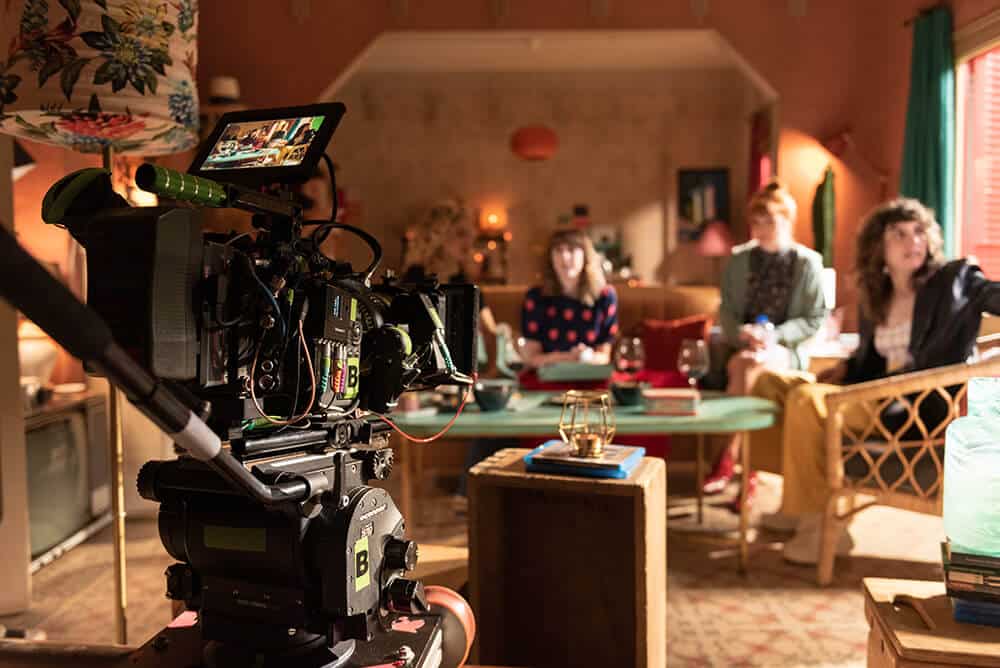
VALERIA (L to R) in episode XX of VALERIA. Cr. FELIPE HERNÁNDEZ/NETFLIX © 2022
Netflix is Not Scaling Back Its Ambitions in Spain
During a roundtable with both Tanz and Ávalos, the duo was asked about whether they’re scaling back their output from Spain or, indeed, from other international regions.
The answer was a resounding no. “Our members really love local films and series,” Tanz said, adding that variety is key to success serving 270 million households, equating to 500 million viewers, adding that “no entertainment company has tried to program that breadth and with that ambition.”
Ávalos cited that they’ve, in fact, “doubled down” when it comes to output, looking at the fact they’ve just really started getting into unscripted for the first time for the past two and a half years and went on to say that the WWE pickup was particularly good as “Spain is a great market for it.” The recent Alcaraz-Nadal tennis match (The Netflix Slam) was also cited as a sports event programmed well for Spanish audiences.
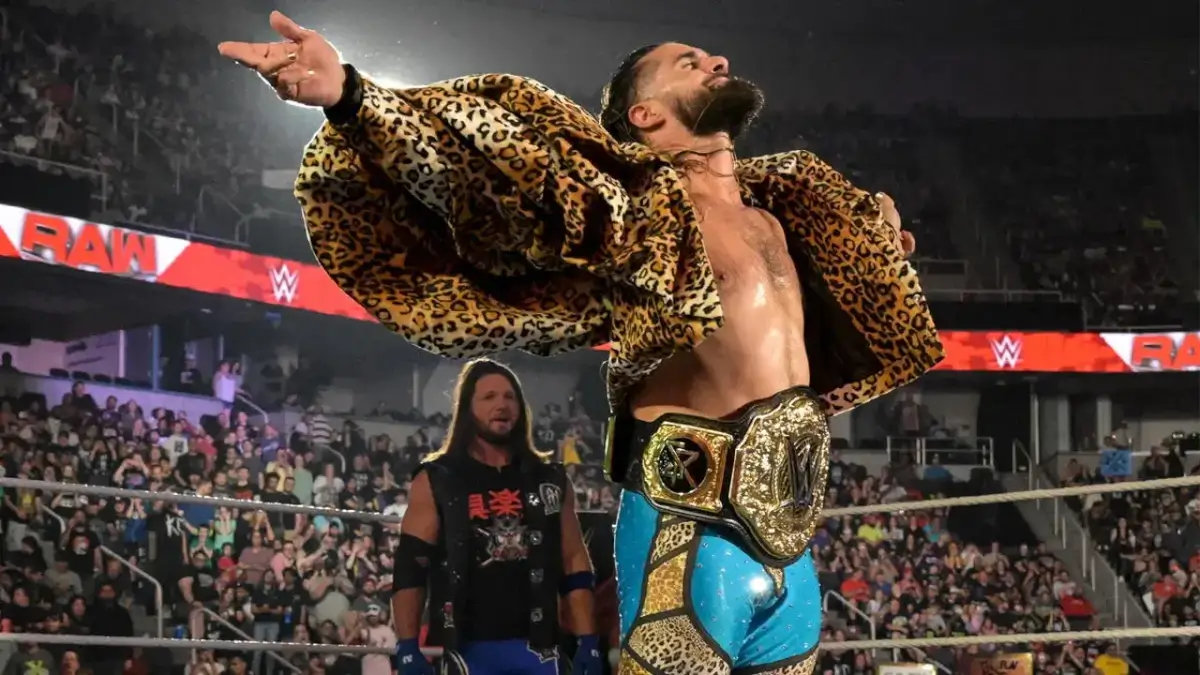
Picture: TKO
“We have not reduced at all,” said Ávalos, “If we see a new opportunity that we want to pursue, we pursue that opportunity to make sure that our members are getting the entertainment, the storytelling, and satisfaction that they’re looking for from an entertainment company like ours.”
The duo also discussed film strategy, suggesting that acquiring films is just as efficient as making them. “From a Spain perspective, film is super central to what we do,” Ávalos said, adding, “They [Netflix subscribers] don’t differentiate where a great film is coming from, whether it originated within Netflix or elsewhere.”
To that end, Tanz suggested that it’s more “meaningful” to premiere series on Netflix rather than films. “Following something that’s already been on TV is less special than following something that was just in the theatre.”
Netflix cited its partnerships with European studios and distributors to enhance its film library through pay-one licensing windows or other collaborations. Examples included deals with Constantin Film in Germany, Studio Canal in the UK, PiperFilm in Italy, and SF in Sweden. These collaborations allow Netflix to finance and acquire high-quality films, benefiting both the creators and Netflix’s members.
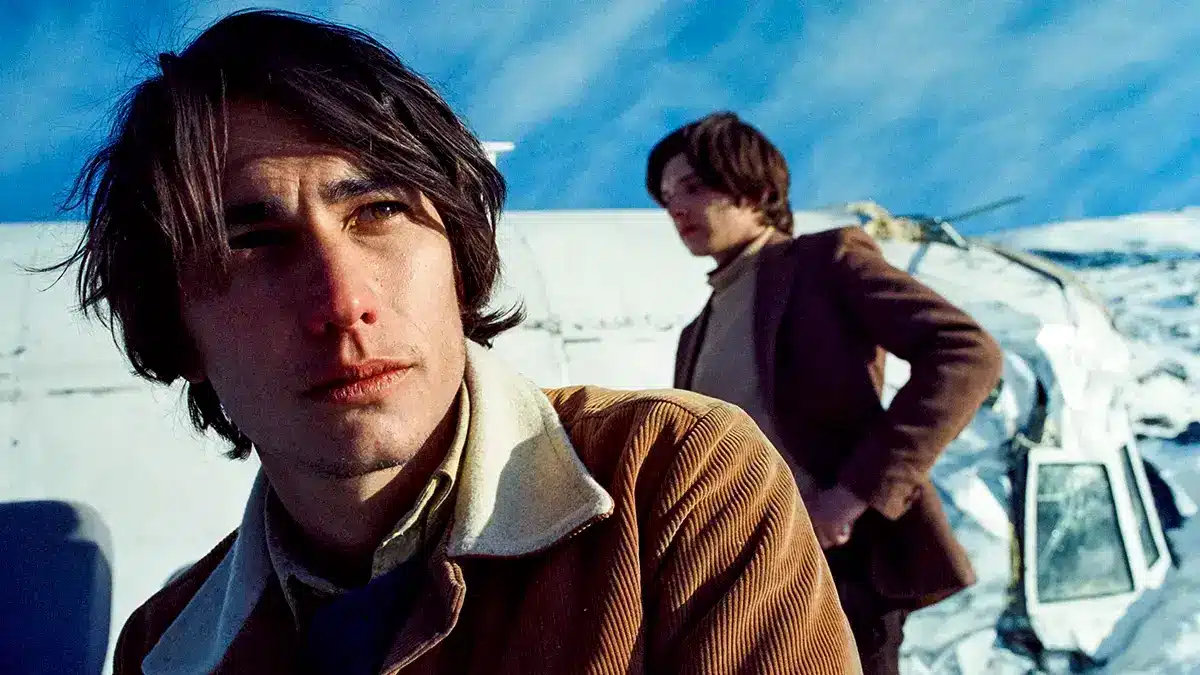
Society of the Snow – Picture: Netflix
Álex Pina New Show & Virtual Sound Stage
The final of the three set visits involved getting a demo of the virtual sound stage (sometimes referred to as The Volume). Essentially, it’s a set with a large panel of LEDs that can be wrapped around it to give the appearance of being in a particular location.
It is very impressive to see this up close and in the context of a scene being filmed where it can adjust. The Mandalorian is perhaps the most famous example of a show using this technology. Netflix has been using it in various locations for a while now, with Avatar: The Last Airbender and 1899 being the two biggest examples.
The tour suggested that many productions are taking advantage of this technology, with driving scenes being cited as one of the main ways shows utilize it.
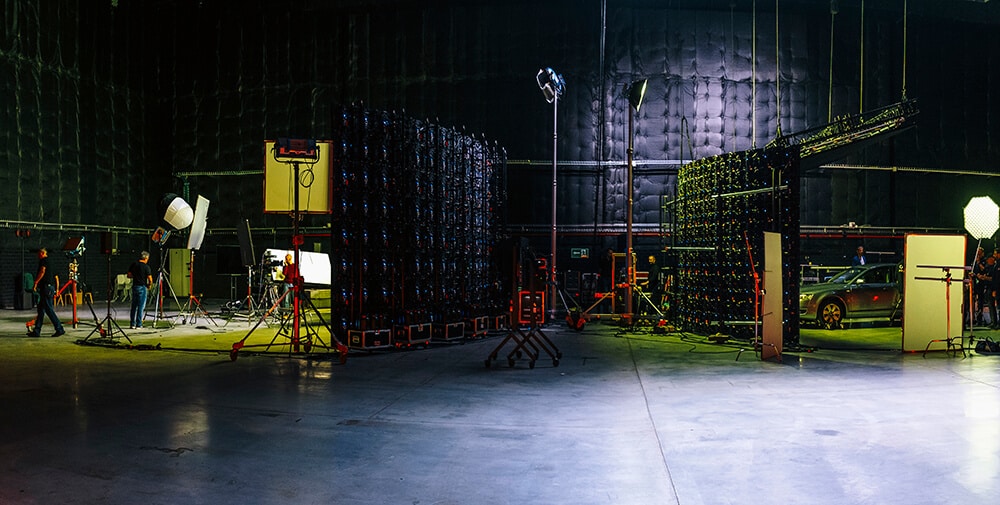
Picture: Netflix
We also saw multiple takes of an upcoming show that was done live while visiting. While I’m not allowed to discuss what I saw in detail, we can say it was filming for The Fallout Shelter and looked like a signature Pina show. I’m very excited.
Other Takeaways From The Day
- Early in the tour, Tanz was particularly keen to emphasize the importance of aiming all its local content first and foremost to be hits in their local countries, as you cannot have a global hit without it being a hit in its home country.
- In the roundtable, the two executives spoke about adapting some of their local shows in other countries. Elite famously got an Indian adaptation, and Money Heist also received a Korean adaptation. They expressed that this could happen more, but only if creators can adapt stories in ways that resonate within their cultural contexts. This extends to unscripted titles like Love is Blind.
- This point seems obvious, but the two main sets we visited were permanent structures, with both shows using them having already wrapped. Despite that and the long wait to release (2024 Breathless and 2025 for The Lady’s Companion), the sets remain in wait in the hopes of renewal. Both are planned to get renewals, and development is already taking place on both, but ultimately, it will come down to Netflix’s membership to decide whether they get renewed. This space is effectively redundant during this period, emphasizing how much risk and abet these productions are.
As mentioned, I wasn’t the only journalist on this trip. You can see the reports filed by Tim Dams from ScreenDaily here and Max Goldbart from Deadline here. Sadly, I couldn’t find some of the other international journalists present.
That’s all I have to say about my trip to Tres Cantos. It was a great experience, and I hope it won’t be the last!




